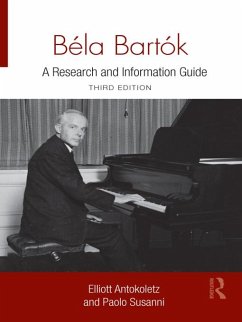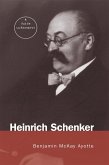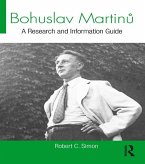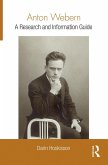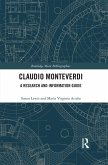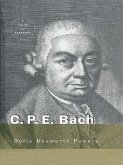45,95 €
45,95 €
inkl. MwSt.
Sofort per Download lieferbar

23 °P sammeln
45,95 €
Als Download kaufen

45,95 €
inkl. MwSt.
Sofort per Download lieferbar

23 °P sammeln
Jetzt verschenken
Alle Infos zum eBook verschenken
45,95 €
inkl. MwSt.
Sofort per Download lieferbar
Alle Infos zum eBook verschenken

23 °P sammeln
- Format: PDF
- Merkliste
- Auf die Merkliste
- Bewerten Bewerten
- Teilen
- Produkt teilen
- Produkterinnerung
- Produkterinnerung

Bitte loggen Sie sich zunächst in Ihr Kundenkonto ein oder registrieren Sie sich bei
bücher.de, um das eBook-Abo tolino select nutzen zu können.
Hier können Sie sich einloggen
Hier können Sie sich einloggen
Sie sind bereits eingeloggt. Klicken Sie auf 2. tolino select Abo, um fortzufahren.

Bitte loggen Sie sich zunächst in Ihr Kundenkonto ein oder registrieren Sie sich bei bücher.de, um das eBook-Abo tolino select nutzen zu können.
This research guide is an annotated bibliography of primary and secondary sources and catalogue of Bartók's compositions. Since the publication of the second edition, a wealth of information has been proliferating in the field of Bartók research. The third edition of this research guide provides an update in this field and represents the multidisciplinary research areas in the growing Bartók literature.
- Geräte: PC
- mit Kopierschutz
- eBook Hilfe
- Größe: 2.48MB
Andere Kunden interessierten sich auch für
![Alma Mahler and Her Contemporaries (eBook, PDF) Alma Mahler and Her Contemporaries (eBook, PDF)]() Susan FillerAlma Mahler and Her Contemporaries (eBook, PDF)43,95 €
Susan FillerAlma Mahler and Her Contemporaries (eBook, PDF)43,95 €![Heinrich Schenker (eBook, PDF) Heinrich Schenker (eBook, PDF)]() Benjamin AyotteHeinrich Schenker (eBook, PDF)52,95 €
Benjamin AyotteHeinrich Schenker (eBook, PDF)52,95 €![Bohuslav Martinu (eBook, PDF) Bohuslav Martinu (eBook, PDF)]() Robert SimonBohuslav Martinu (eBook, PDF)54,95 €
Robert SimonBohuslav Martinu (eBook, PDF)54,95 €![Anton Webern (eBook, PDF) Anton Webern (eBook, PDF)]() Darin HoskissonAnton Webern (eBook, PDF)43,95 €
Darin HoskissonAnton Webern (eBook, PDF)43,95 €![Claudio Monteverdi (eBook, PDF) Claudio Monteverdi (eBook, PDF)]() Susan LewisClaudio Monteverdi (eBook, PDF)45,95 €
Susan LewisClaudio Monteverdi (eBook, PDF)45,95 €![Frederick Delius (eBook, PDF) Frederick Delius (eBook, PDF)]() Mary HuismannFrederick Delius (eBook, PDF)49,95 €
Mary HuismannFrederick Delius (eBook, PDF)49,95 €![C.P.E. Bach (eBook, PDF) C.P.E. Bach (eBook, PDF)]() Doris Bosworth PowersC.P.E. Bach (eBook, PDF)52,95 €
Doris Bosworth PowersC.P.E. Bach (eBook, PDF)52,95 €-
-
-
This research guide is an annotated bibliography of primary and secondary sources and catalogue of Bartók's compositions. Since the publication of the second edition, a wealth of information has been proliferating in the field of Bartók research. The third edition of this research guide provides an update in this field and represents the multidisciplinary research areas in the growing Bartók literature.
Dieser Download kann aus rechtlichen Gründen nur mit Rechnungsadresse in A, B, BG, CY, CZ, D, DK, EW, E, FIN, F, GR, HR, H, IRL, I, LT, L, LR, M, NL, PL, P, R, S, SLO, SK ausgeliefert werden.
Produktdetails
- Produktdetails
- Verlag: Taylor & Francis eBooks
- Seitenzahl: 500
- Erscheinungstermin: 14. April 2011
- Englisch
- ISBN-13: 9781135845414
- Artikelnr.: 38263165
- Verlag: Taylor & Francis eBooks
- Seitenzahl: 500
- Erscheinungstermin: 14. April 2011
- Englisch
- ISBN-13: 9781135845414
- Artikelnr.: 38263165
- Herstellerkennzeichnung Die Herstellerinformationen sind derzeit nicht verfügbar.
Elliott Antokoletz
Preface to the Third Edition
Preface to the Second Edition
Preface to the First Edition
History of Bartók's Musical Development: An Introduction
1. Basic Sources of Bartók's Style
2. Early Germanic Musical Influences from 1897 to 1902
3. Influence of Liszt, the Magyar Nóta, and First Contact with Authentic
Hungarian Folk Music (1902-1905)
4. Bartók's First Folk-Music Investigations, His Discovery of Debussy, and
Early Compositional Results (1905 through World War I)
5. Expanded Folk-Music Investigations and First Mature Compositions
6. Toward Synthesis of Divergent Art- and Folk-Music Sources
7. End of World War I to Mid-1920s
8. Final Period (1926-1945)
9. Last Years in the United States (1940-1945)
I. Published Compositions According to Genre: With Publishers, Archives,
Collections, and Catalogues
Catalogue of Compositions
1. Piano Solo
2. Chamber Music
3. Solo Instruments and Orchestra
4. Full or Small Orchestra
5. Solo Voice and Piano
6. Chorus, A Cappella and with Piano
7. Voice and Orchestra
8. Chorus and Orchestra
9. Stage Works
10. Bartók's Editions and Transcriptions of Keyboard Works by Other
Composers
II. Primary Sources: Bartók's Writings and Other Documents
1. Articles by Bartók
2. Essays in Collected Editions
3. Letters in Collected Editions
4. Letters Published Individually in Other Works
5. Documents, Pictures, Letters, and Essays in Collected Editions
6. Folk Music Collections
7. Facsimiles, Reprints, and Revisions of the Music
III. Biographical and Historical Studies
1. General Studies of Bartók's Life and Music, His Background, Time, and
Forebears
2. Discussions of Specific Biographical Events, Aspects, and Details
3. Specialized Studies of Bartók's Career and Work as Ethnomusicologist
4. Specialized Discussions of Bartók's Personality, Philosophical Views,
Political Attitudes, and/or Philosophy of Composition
5. Discussions Dealing with the State of Bartók Research or Performance
IV. Studies of Bartók's Musical Compositions
1. Analytical and Theoretical Studies of Bartók's Works
2. Studies of Bartók's Style and Aesthetics
3. Folk-Music Influences on Bartók's Compositions
4. Art-Music Influences on Bartók's Compositions
5. Bartók's Influences on Others
6. Studies of Bartók's Compositional Process (Sketches, Manuscript Drafts,
Editions, Versions, His Own Recordings) and/or History of the Works
7. Bartók's Orientation Toward Pedagogy and/or Performance Interpretation
V. Discussions of Institutional Sources for Bartók Research
and Essays in Collected Volumes
1. Archives, Special Libraries, Societies, Organizations, and Institutes
Devoted to Bartók
2. Bibliographies, Discographies, and Catalogues
3. Conferences, Festivals, Journals, Newsletters, and Special Issues
Devoted or Relevant to Bartók
4. Computerized Data Bases for Analysis and Research
5. Bartók Websites
Author-Title Index
Index of Bartók's Compositions, Keyboard Editions, and Transcriptions
Index of Proper Names
Subject Index
Preface to the Second Edition
Preface to the First Edition
History of Bartók's Musical Development: An Introduction
1. Basic Sources of Bartók's Style
2. Early Germanic Musical Influences from 1897 to 1902
3. Influence of Liszt, the Magyar Nóta, and First Contact with Authentic
Hungarian Folk Music (1902-1905)
4. Bartók's First Folk-Music Investigations, His Discovery of Debussy, and
Early Compositional Results (1905 through World War I)
5. Expanded Folk-Music Investigations and First Mature Compositions
6. Toward Synthesis of Divergent Art- and Folk-Music Sources
7. End of World War I to Mid-1920s
8. Final Period (1926-1945)
9. Last Years in the United States (1940-1945)
I. Published Compositions According to Genre: With Publishers, Archives,
Collections, and Catalogues
Catalogue of Compositions
1. Piano Solo
2. Chamber Music
3. Solo Instruments and Orchestra
4. Full or Small Orchestra
5. Solo Voice and Piano
6. Chorus, A Cappella and with Piano
7. Voice and Orchestra
8. Chorus and Orchestra
9. Stage Works
10. Bartók's Editions and Transcriptions of Keyboard Works by Other
Composers
II. Primary Sources: Bartók's Writings and Other Documents
1. Articles by Bartók
2. Essays in Collected Editions
3. Letters in Collected Editions
4. Letters Published Individually in Other Works
5. Documents, Pictures, Letters, and Essays in Collected Editions
6. Folk Music Collections
7. Facsimiles, Reprints, and Revisions of the Music
III. Biographical and Historical Studies
1. General Studies of Bartók's Life and Music, His Background, Time, and
Forebears
2. Discussions of Specific Biographical Events, Aspects, and Details
3. Specialized Studies of Bartók's Career and Work as Ethnomusicologist
4. Specialized Discussions of Bartók's Personality, Philosophical Views,
Political Attitudes, and/or Philosophy of Composition
5. Discussions Dealing with the State of Bartók Research or Performance
IV. Studies of Bartók's Musical Compositions
1. Analytical and Theoretical Studies of Bartók's Works
2. Studies of Bartók's Style and Aesthetics
3. Folk-Music Influences on Bartók's Compositions
4. Art-Music Influences on Bartók's Compositions
5. Bartók's Influences on Others
6. Studies of Bartók's Compositional Process (Sketches, Manuscript Drafts,
Editions, Versions, His Own Recordings) and/or History of the Works
7. Bartók's Orientation Toward Pedagogy and/or Performance Interpretation
V. Discussions of Institutional Sources for Bartók Research
and Essays in Collected Volumes
1. Archives, Special Libraries, Societies, Organizations, and Institutes
Devoted to Bartók
2. Bibliographies, Discographies, and Catalogues
3. Conferences, Festivals, Journals, Newsletters, and Special Issues
Devoted or Relevant to Bartók
4. Computerized Data Bases for Analysis and Research
5. Bartók Websites
Author-Title Index
Index of Bartók's Compositions, Keyboard Editions, and Transcriptions
Index of Proper Names
Subject Index
Preface to the Third Edition
Preface to the Second Edition
Preface to the First Edition
History of Bartók's Musical Development: An Introduction
1. Basic Sources of Bartók's Style
2. Early Germanic Musical Influences from 1897 to 1902
3. Influence of Liszt, the Magyar Nóta, and First Contact with Authentic
Hungarian Folk Music (1902-1905)
4. Bartók's First Folk-Music Investigations, His Discovery of Debussy, and
Early Compositional Results (1905 through World War I)
5. Expanded Folk-Music Investigations and First Mature Compositions
6. Toward Synthesis of Divergent Art- and Folk-Music Sources
7. End of World War I to Mid-1920s
8. Final Period (1926-1945)
9. Last Years in the United States (1940-1945)
I. Published Compositions According to Genre: With Publishers, Archives,
Collections, and Catalogues
Catalogue of Compositions
1. Piano Solo
2. Chamber Music
3. Solo Instruments and Orchestra
4. Full or Small Orchestra
5. Solo Voice and Piano
6. Chorus, A Cappella and with Piano
7. Voice and Orchestra
8. Chorus and Orchestra
9. Stage Works
10. Bartók's Editions and Transcriptions of Keyboard Works by Other
Composers
II. Primary Sources: Bartók's Writings and Other Documents
1. Articles by Bartók
2. Essays in Collected Editions
3. Letters in Collected Editions
4. Letters Published Individually in Other Works
5. Documents, Pictures, Letters, and Essays in Collected Editions
6. Folk Music Collections
7. Facsimiles, Reprints, and Revisions of the Music
III. Biographical and Historical Studies
1. General Studies of Bartók's Life and Music, His Background, Time, and
Forebears
2. Discussions of Specific Biographical Events, Aspects, and Details
3. Specialized Studies of Bartók's Career and Work as Ethnomusicologist
4. Specialized Discussions of Bartók's Personality, Philosophical Views,
Political Attitudes, and/or Philosophy of Composition
5. Discussions Dealing with the State of Bartók Research or Performance
IV. Studies of Bartók's Musical Compositions
1. Analytical and Theoretical Studies of Bartók's Works
2. Studies of Bartók's Style and Aesthetics
3. Folk-Music Influences on Bartók's Compositions
4. Art-Music Influences on Bartók's Compositions
5. Bartók's Influences on Others
6. Studies of Bartók's Compositional Process (Sketches, Manuscript Drafts,
Editions, Versions, His Own Recordings) and/or History of the Works
7. Bartók's Orientation Toward Pedagogy and/or Performance Interpretation
V. Discussions of Institutional Sources for Bartók Research
and Essays in Collected Volumes
1. Archives, Special Libraries, Societies, Organizations, and Institutes
Devoted to Bartók
2. Bibliographies, Discographies, and Catalogues
3. Conferences, Festivals, Journals, Newsletters, and Special Issues
Devoted or Relevant to Bartók
4. Computerized Data Bases for Analysis and Research
5. Bartók Websites
Author-Title Index
Index of Bartók's Compositions, Keyboard Editions, and Transcriptions
Index of Proper Names
Subject Index
Preface to the Second Edition
Preface to the First Edition
History of Bartók's Musical Development: An Introduction
1. Basic Sources of Bartók's Style
2. Early Germanic Musical Influences from 1897 to 1902
3. Influence of Liszt, the Magyar Nóta, and First Contact with Authentic
Hungarian Folk Music (1902-1905)
4. Bartók's First Folk-Music Investigations, His Discovery of Debussy, and
Early Compositional Results (1905 through World War I)
5. Expanded Folk-Music Investigations and First Mature Compositions
6. Toward Synthesis of Divergent Art- and Folk-Music Sources
7. End of World War I to Mid-1920s
8. Final Period (1926-1945)
9. Last Years in the United States (1940-1945)
I. Published Compositions According to Genre: With Publishers, Archives,
Collections, and Catalogues
Catalogue of Compositions
1. Piano Solo
2. Chamber Music
3. Solo Instruments and Orchestra
4. Full or Small Orchestra
5. Solo Voice and Piano
6. Chorus, A Cappella and with Piano
7. Voice and Orchestra
8. Chorus and Orchestra
9. Stage Works
10. Bartók's Editions and Transcriptions of Keyboard Works by Other
Composers
II. Primary Sources: Bartók's Writings and Other Documents
1. Articles by Bartók
2. Essays in Collected Editions
3. Letters in Collected Editions
4. Letters Published Individually in Other Works
5. Documents, Pictures, Letters, and Essays in Collected Editions
6. Folk Music Collections
7. Facsimiles, Reprints, and Revisions of the Music
III. Biographical and Historical Studies
1. General Studies of Bartók's Life and Music, His Background, Time, and
Forebears
2. Discussions of Specific Biographical Events, Aspects, and Details
3. Specialized Studies of Bartók's Career and Work as Ethnomusicologist
4. Specialized Discussions of Bartók's Personality, Philosophical Views,
Political Attitudes, and/or Philosophy of Composition
5. Discussions Dealing with the State of Bartók Research or Performance
IV. Studies of Bartók's Musical Compositions
1. Analytical and Theoretical Studies of Bartók's Works
2. Studies of Bartók's Style and Aesthetics
3. Folk-Music Influences on Bartók's Compositions
4. Art-Music Influences on Bartók's Compositions
5. Bartók's Influences on Others
6. Studies of Bartók's Compositional Process (Sketches, Manuscript Drafts,
Editions, Versions, His Own Recordings) and/or History of the Works
7. Bartók's Orientation Toward Pedagogy and/or Performance Interpretation
V. Discussions of Institutional Sources for Bartók Research
and Essays in Collected Volumes
1. Archives, Special Libraries, Societies, Organizations, and Institutes
Devoted to Bartók
2. Bibliographies, Discographies, and Catalogues
3. Conferences, Festivals, Journals, Newsletters, and Special Issues
Devoted or Relevant to Bartók
4. Computerized Data Bases for Analysis and Research
5. Bartók Websites
Author-Title Index
Index of Bartók's Compositions, Keyboard Editions, and Transcriptions
Index of Proper Names
Subject Index
